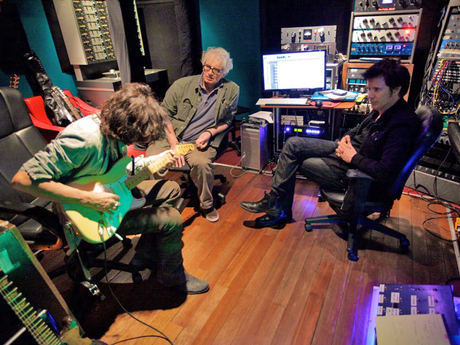
Want all the hottest music and gear news, reviews, deals, features and more, direct to your inbox? Sign up here.
You are now subscribed
Your newsletter sign-up was successful
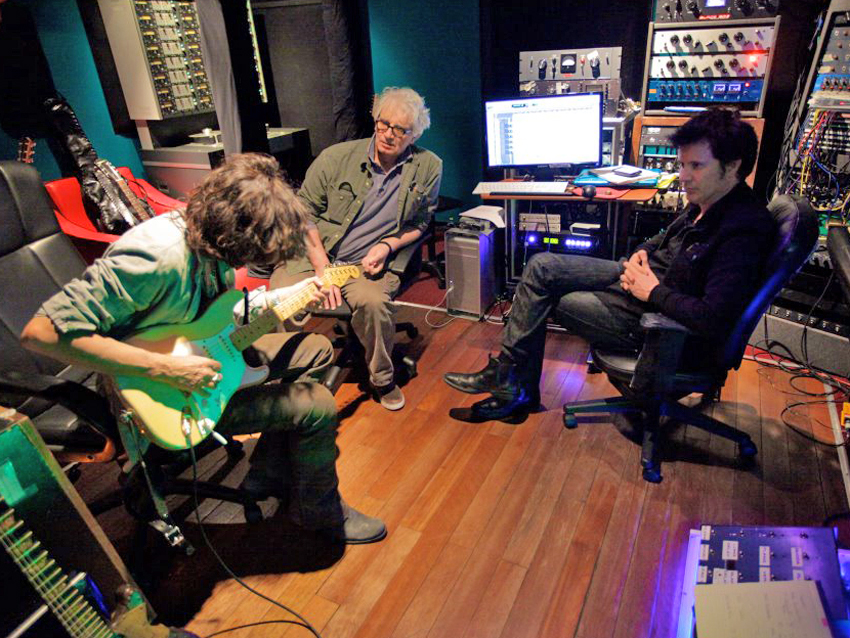
Joe Perry lays down a guitar track at Swing House Studios while producer Jack Douglas (center) and engineer Warren Huart (right) look on.
When Aerosmith release a new album this year - their first since 2004's Honkin' On Bobo, and their first collection of fresh material since 2001's Just Push Play - longtime fans are hoping that it will mark a return to the mean, raunchy, riff-oriented, blues-rock sound the group mined on the '70s classics Get Your Wings, Toys In The Attic and Rocks.
In that regard, producer Jack Douglas says the upcoming record won't disappoint. He's in a uniquely qualified position to make such a claim: not only is he helming the new set, but he also manned the board for most of the group's best-loved discs. "We're going back to the rawness," says Douglas. "There's something special about the vintage Aerosmith vibe, and that's what we have here."
For Douglas, capturing the group's untamed spirit on tape means just that - using tape. To that end, the veteran producer, whose resume also includes work with John Lennon, Cheap Trick and Patti Smith, is utilizing CLASP (Closed Loop Analog Signal Processor), a unit which allows him to integrate real two-inch tape technology into a DAW signal and workflow.
Joining Douglas behind the glass is fellow tape and CLASP enthusiast, Warren Huart. Huart serves as engineer on the Aerosmith project, but in recent years he's produced The Fray, James Blunt, Howie Day and Augustana, among others. What's more, he's also the proud owner of Swing House Studios in Hollywood, where the Aerosmith team have called home for the past few months as they lay down vocals and overdubs on one of 2012's most-anticipated releases.
MusicRadar caught up with Douglas and Huart recently to talk about the sonic wonders of CLASP, their approach to working with Aerosmith, the band's indefatigable energy and how the director of Desperado and Spy Kids somehow fits into the picture.
How did you two start working together?
Want all the hottest music and gear news, reviews, deals, features and more, direct to your inbox? Sign up here.
Jack Douglas: "I was working at Swing House on other projects, a few film things, and I did a Michael Monroe record there. I really liked Swing House, and it kind of became my place to park myself on the West Coast. The rooms are comfortable, the equipment is great - I keep a lot of my gear there, actually.
Warren Huart: "Probably 50 percent of the equipment at Swing House is my gear and 50 percent is Jack's. We share a lot of tube equipment. Jack's Pulse Technologies stuff is fantastic - they're replicas of Pultecs."
Douglas: "Warren and I would trade rooms on and off for about two years, and we became friendly. I knew he was knowledgeable and extremely capable. Plus, he's a guitarist, which is good - knowing guitars is very important when it comes to working with a band like Aerosmith. When the new project came up, I gave him a call.
"The person I usually work with on Aerosmith, Jay Messina, he has boundaries - he won't go crazy with his hours. With Aerosmith, you have to be ready to work when they're ready, and on a long-term basis. You can't do five days a week, eight hours a day with these guys. The other night, we were working till one in the morning - that's just what it takes. Warren was up for that, so I brought him out to Boston. The boys liked him, and that was that."
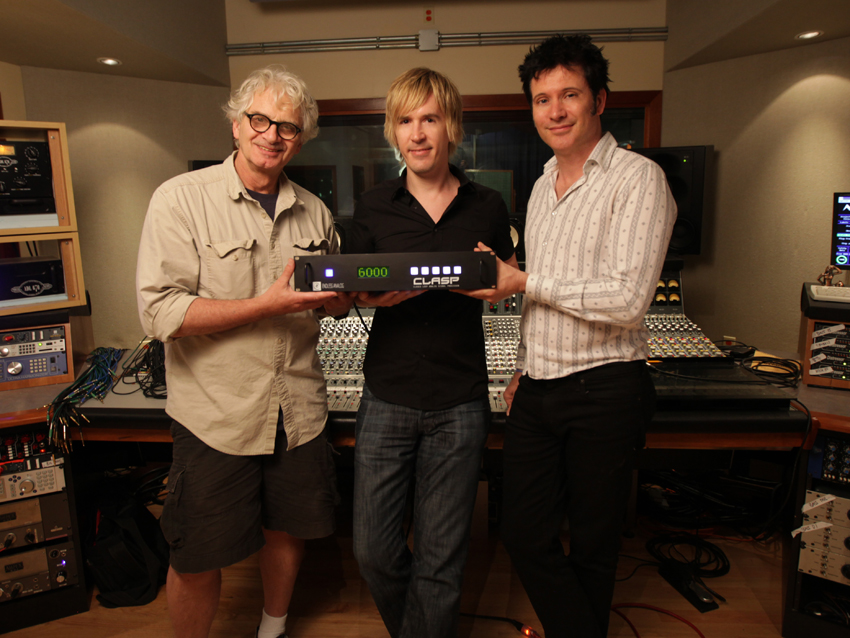
Douglas and Huart flank CLASP inventor Chris Estes.
So Warren, what's it like working with Jack?
Huart: "It's great. What can I say? You know, I produce 90 percent of the stuff I work on. Even when I engineer something for a major label - whether it's Howie Day or James Blunt or whomever - a lot of the time I'm the co-producer, and I even play on the stuff, too.
"In this role, as an engineer, you have to be with somebody you can respect. Jack's worked with Aerosmith and John Lennon and incredible artists. But Jack is in the handful of guys, he's like a Phil Ramone or a George Martin. He has a real vision, but he's able to make everybody feel comfortable, which allows people to do their best. And that lets me be creative, too. You don't have to be afraid to bring up an idea."
How did you guys first become aware of CLASP?
Huart: "I got in very early in the development stage. I had an assistant who knew Chris Estes, who invented it, and when I first heard about it, I knew it could be phenomenal. I grew up with tape, I loved working with tape. Who doesn't? You can do so much with it. So, to me, CLASP offered the best of both worlds. You can use and abuse tape on the way in, and then you can have it instantly in a digital stage to edit it."
Douglas: "I think it was my son, Blake Douglas, that first turned me onto it. He owns some studios in LA. He has Record One, which used to be Ocean Way; he has Stage & Sound; and he has a room on a yearly lease at EastWest. He's in the hip-hop business. But he's an equipment dealer, too, and he was the one to tell me about CLASP.
"The whole idea of CLASP got me really buzzed. I went out and bought a beautiful old A80, anticipating that I was going to buy a CLASP unit. I met with Chris Estes, and we talked about the technology. I thought, This could really work for Aerosmith; this will sound pretty good.
"We got a couple of units on loan for the band's studio, Pandora's Box, and they fell in love with them, so they purchased the CLASPs. Then Joe bought one for his A80 for his room, the Boneyard. Everybody embraced the whole philosophy of CLASP."
Huart: "I was very excited to make the Aerosmith record my first CLASP project. The other way to do it would be to record everything to tape and then put it to Pro Tools. Working with CLASP seemed like a far better way to go."
What are the advantages of CLASP?
Douglas: "Well, you can keep the warmth of the tape, which, to me, is the big, big plus. There are no advantages to working all-digital. I moved over to digital in 1979. I was curious, so I started using the first 3M machines. Then I went to Mitsubishis and Sonys, but I would go back to tape. I always preferred tape. And I love mixing to tape - the sound is better.
"I do like the convenience of Pro Tools, however. CLASP is the real answer, one which allows me to work with the sound of tape and have the convenience of digital. To record Aerosmith, CLASP has been great. The band totally loves it."
Huart: "The band cut their teeth on tape. The sound of those records, the ones everybody knows and loves, comes from tape. Plus, they have the know-how and the experience… They know the difference sonically. They know what translates for their music. I don't think, with this record, to do it all-digital, would have been a great way to go."
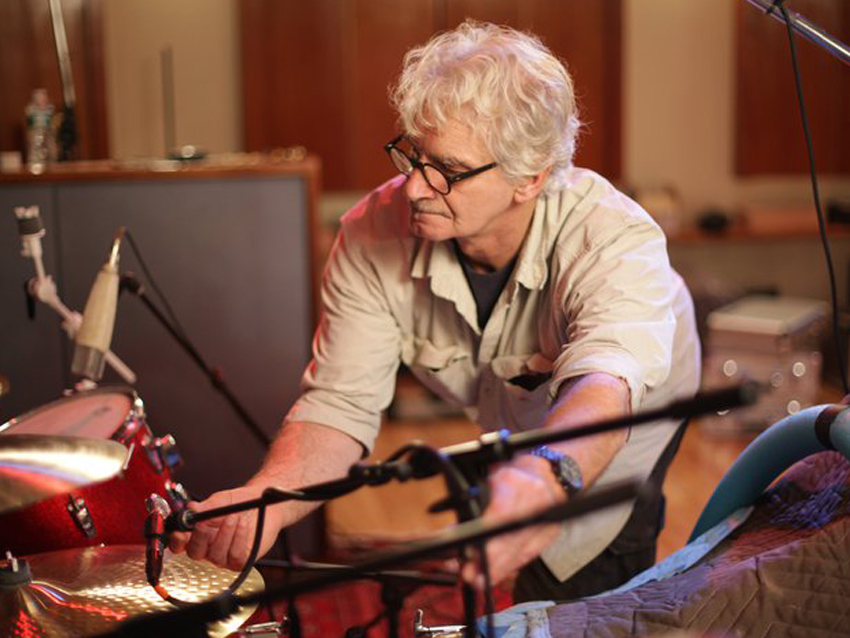
Douglas gets hands on in the studio, adjusting mics on Joey Kramer's drums.
Aside from using CLASP, what kinds of discussions went down as far as the sound for album?
Douglas: "We're going back to the rawness. There's something special about the vintage Aerosmith vibe, and that's what we have here. It's got that '70s feel and sense of humor. It's a bit of a concept album - there's a theme running through it, but I can't really talk about that right now. But to get that edge and spirit, it made sense to capture tracks live with the band playing all out.
"The way Pandora's Box is set up, we can get that. It's a gorgeous room that was designed by John Storyk, and the board was designed by Jay Messina and myself. It's 24 tracks of Neve broadcast modules, eight tracks of API, eight tracks of old Focusrite, and then PAD built a custom eight-buss for us. So they all speak to one another. It's just like having one board - we call it 'Frankenstein.' I had a lot of my gear and my mics sent over to the place.
"Pandora's Box really allowed me to record the band like I did in the '70s. We'd sit in the production office and start with the germ of a song - just acoustic guitars and some basic ideas - and then we'd take that and go into a rehearsal room. In that room, we have small amps and keyboards, and we'll record everything we do there into my laptop. After that, once it's right, we'll take it into the big room and record it. If we need to make changes, we'll make them later.
"We recorded everything at Pandora's Box except for two songs, which we did at Swing House. One song was something we decided we could do a little better, and the other one was brand new - that's the one that Sony likes and is convinced is a big hit single."
But you are doing some overdubs at Swing House.
Douglas: "Well, yeah, we're doing a lot of the guitars, the leads. When Steven gets done with American Idol and comes in to do vocals, we're figure out what has to go around them."
Throughout the process, have there been any demos at all?
Douglas: "Yeah, sure. Very often, if a song didn't begin with a germ of an idea in the studio, it was from a demo. But again, we'd sit and listen to that and get a lot of the band's input, and then we'd knock out some changes. I think it's fun to track right away because everything is fresh. For me, the demo stage is when we're in that rehearsal room. We'll spend days in there listening to what we have."
And when the band tracks, it's off-the-floor live performances?
Huart: "A large portion is just that: off-the-floor takes. It's the band playing together. That's the beauty of this band - they can play. Joey Kramer hits those drums. He's an animal."
Douglas: "Right. Steven's in the middle with a vocal mic - he knows where the verses and choruses are. It's live."
Jack, what do you think the band looks to you for? Do you give them "brutal truth"?
Douglas: "It's brutal truth, sure, but we're like brothers, really. There's never any pretense. I'm willing to listen to any idea the band has. It's very communal. We always support each other. Even when I wasn't producing their records, whether it was during the '90s, there was a lot of hanging out. We know what each other can do. There's no bullshit."
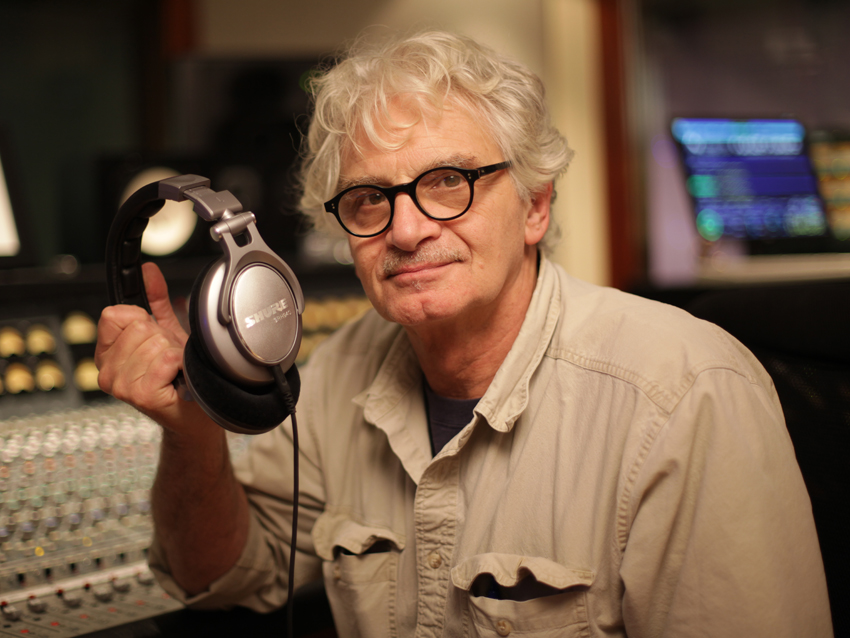
Douglas is Shure of his choice of headphones.
Has the band worked with any outside songwriters?
Douglas: "Marti Frederiksen. Marti's contributed some. On the lyrical side, I wanted Steven to really have somebody to bounce his lyrics off of, so I said to Sony that we should bring in Stephen King."
Stephen King, the novelist?
Douglas: "That's right. They thought I was crazy, but I thought he'd be into it. Here's who I had on my list: Stephen King; Robert Rodriguez, the director; and Tim Burton. They thought I was nuts, but I said, 'Let's try.' As it turned out, Stephen King said, 'I wish you had contacted me a month earlier - I'm writing with John Mellencamp!' [laughs] How funny is that? People thought I lost my mind, and there he is, working with Mellencamp."
These are amazing ideas!
Douglas: "I think you have to be creative. So what's happened was, Robert Rodriguez has come in, and he and Steven have gotten together. Robert's got great ideas - he's a brilliant director, but he's a musician, too. We're waiting to hear from Tim Burton, but in the meantime, we're doing fine."
What new pieces of gear do Joe Perry and the rest of the band have?
Douglas: "The thing with Aerosmith is, you don't find a lot of new pieces, but you find some incredible old pieces. Joe has a connection to these amazing RCA and Bogen PA amps, and they're being converted to 30-watt guitar amps, so we've been using a lot of them. We've been using my Producer Model Morris amp - they're a boutique company out of St. Catherine's, Ontario.
"The only new thing that I think is new is an Epiphone Casino, which has been reissued. Brad fell in love with that - it's got a great, woody tone. The band collects a lot of incredible pieces that sound wonderful. They're a part of history, but we do use them."
Huart: "You go into Joe Perry's place, and it's like a wish-list of stuff. You stand there and say, 'I wish we could use a…' and there it is. 'Oh, I'd like to try a preamp like…' and he's got it. His console is full of 1073s. He's got a tape machine. You name it, it's there. I've gone into professional studios, and they can't match what Joe Perry has.
"But he's still into trying out new pedals and things. The whole band is. They have a thirst for sound, a quest for tone, that you wouldn't believe."
Jack, you've worked with the band for so long, but what impresses you about them these days?
"First, you have to consider that these guys are all over 50 years old and still have the ability to just rock really hard. There's so much edge going on, and they still have the vitality they had when we started 40 years ago.
"Also, Steven has an incredible ear. He and I share an interest in classical music and American standards and jazz. We'll talk about music and Gershwin will come up - we're not afraid to talk in those terms. So that's great that we have that catalogue thing going on. Plus, Brad is such a fan of blues, and the whole band loves '60s British rock. There's deep musical roots to these guys."
And Warren, what impresses you about Aerosmith?
Huart: "That they play like a band in their 20s. We're not putting a lot of things together, at least not what you'd think. Most of these tracks have been flat-out, off-the-floor performances. Their enthusiasm and commitment is not what you'd expect for a band over the age of 25. They feel the same way about playing music as they did when they were making their first album.
"Take Joe Perry: He 's in here, on time if not early, to do overdubs. Steven's in here at all hours working on vocals. He does American Idol and then he comes in here. We're talking about amazing talents, and they work hard. What they do is beyond human, but it comes from work and commitment."
Joe is a freelance journalist who has, over the past few decades, interviewed hundreds of guitarists for Guitar World, Guitar Player, MusicRadar and Classic Rock. He is also a former editor of Guitar World, contributing writer for Guitar Aficionado and VP of A&R for Island Records. He’s an enthusiastic guitarist, but he’s nowhere near the likes of the people he interviews. Surprisingly, his skills are more suited to the drums. If you need a drummer for your Beatles tribute band, look him up.
